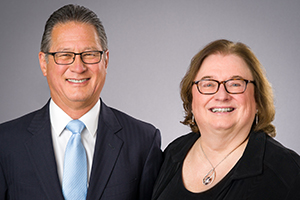How the Pandemic Accelerated Technology Adoption by Lawyers
The Bencher—July/August 2021
By Sharon D. Nelson, Esquire, and John W. Simek

 In March 2020, virtually all law firms across the country shut down. The shock waves rippled nationwide as lawyers suddenly found themselves working from home.
In March 2020, virtually all law firms across the country shut down. The shock waves rippled nationwide as lawyers suddenly found themselves working from home.
The first challenge was setting up at home. Some lawyers used home computers, while others used their work laptops, which were more secure as the devices were part of the firm network. Law firms, understanding that work-from-home was going to be long term, sent or purchased docking stations, multiple monitors, and even standing desks in some cases.
The Rise of Video Conferencing
The legal world took quick note of the wholesale adoption of Zoom for video conferencing. While not secure at the outset, Zoom quickly battened down the hatches and implemented true end-to-end encryption. Webex is the only other platform with end-to-end encryption, but it hasn’t garnered the popularity of the very reliable and easy-to-use Zoom.
Clients and potential clients drove the adoption of Zoom as everyone glommed onto it within weeks of the shutdown. Microsoft Teams is growing in popularity but used primarily in-house because of the tight integration with a firm’s active directory structure. It is included free with most Microsoft 365 subscriptions.
Clio Legal Trends Report 2020
Clio’s October 2020 Legal Trends Report was startling. Here’s how the respondents reported adapting to the pandemic:
- 85% used practice management software.
- 79% used the cloud to store law firm data.
- 62% allowed clients to share documents securely.
- 73% permitted invoices to be paid electronically.
- 83% met with clients virtually.
While all those statistics were remarkable in showcasing the rapid adoption of technology, statistics about what lawyers planned to do in the future were even more remarkable:
- 96% said they would use practice management software.
- 96% planned to store firm data in the cloud.
- 95% said they would support the use of electronic signatures and econtracts.
- 96% said they would support electronic payments.
- 83% said they would meet with clients virtually.
We believe that, in 2021, more than 90% of lawyers are meeting virtually with clients. But lawyers, having dawdled for decades about adoption of the other kinds of technology referenced above, are now either there or planning to be there soon.
In a February 2021 survey of solo attorneys, Clio reported an extraordinary statistic: Electronic payments, client portals, electronic client intake, and customer relationship management solutions accelerated recovery post-pandemic, resulting in solo lawyers earning over $52,000 more in revenue than other solo firms. Extraordinary.
For lawyers, the pandemic in many ways proved an unexpected blessing as it compelled the profession to embrace legal technology.
From the Trenches
As IT and cybersecurity providers, we have been witnesses to a lot of change in the practice of law. Here are our observations of those changes from the beginning of the pandemic through the first few months of 2021:
- Beyond Zoom, most lawyers are now familiar with Webex and/or Teams.
- Most firms that did not accept electronic payments now do—cash flow has improved.
- Virtually all lawyers now use electronic contracts, usually DocuSign or Adobe Sign.
- Everyone wants to get to the cloud. Virtually all clients use Microsoft 365. All have cloud backups (multiples with at least one always unconnected from the network to prevent being encrypted in a ransomware attack).
- More lawyers are using law practice management software with client portals.
- Firms are purchasing laptops for employees as a primary work device.
- In the rise of ransomware and business email compromise attacks, most are implementing multi-factor authentication and endpoint protection.
Retired Judge Arthur “Monty” Ahalt of Maryland was fond of saying, “We are the only profession that works by looking in the rearview mirror.”
Times have changed. Lawyers now understand that to stay relevant and attract new clients (and keep current clients), they must be willing to embrace change—in particular, technology. They have done an admirable job of doing so with no end in sight.
Sharon D. Nelson, Esquire, is a practicing attorney and the president of Sensei Enterprises, Inc. She is a co-author of 18 books published by the American Bar Association. John W. Simek is vice president of Sensei Enterprises, Inc. He is a certified information systems security professional, certified ethical hacker, and a nationally known expert in the area of digital forensics. He and Nelson provide legal technology, cybersecurity, and digital forensics services from their Fairfax, Virginia, firm. You can contact them at snelson@senseient.com and jsimek@senseient.com.